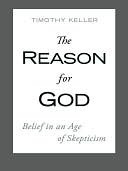More on this book
Community
Kindle Notes & Highlights
Read between
October 5, 2019 - January 2, 2020
A faith without some doubts is like a human body without any antibodies in it. People who blithely go through life too busy or indifferent to ask hard questions about why they believe as they do will find themselves defenseless against either the experience of tragedy or the probing questions of a smart skeptic. A person’s faith can collapse almost overnight if she has failed over the years to listen patiently to her own doubts, which should only be discarded after long reflection. Believers should acknowledge and wrestle with doubts—not only their own but their friends’ and neighbors’. It is
...more
The only way to doubt Christianity rightly and fairly is to discern the alternate belief under each of your doubts and then to ask yourself what reasons you have for believing it. How do you know your belief is true? It would be inconsistent to require more justification for Christian belief than you do for your own, but that is frequently what happens. In fairness you must doubt your doubts. My thesis is that if you come to recognize the beliefs on which your doubts about Christianity are based, and if you seek as much proof for those beliefs as you seek from Christians for theirs—you will
...more
How could you possibly know that no religion can see the whole truth unless you yourself have the superior, comprehensive knowledge of spiritual reality you just claimed that none of the religions have?
It is no more narrow to claim that one religion is right than to claim that one way to think about all religions (namely that all are equal) is right. We are all exclusive in our beliefs about religion, but in different ways.
What is religion then? It is a set of beliefs that explain what life is all about, who we are, and the most important things that human beings should spend their time doing.
Christianity provides a firm basis for respecting people of other faiths. Jesus assumes that nonbelievers in the culture around them will gladly recognize much Christian behavior as “good” (Matthew 5:16; cf. 1 Peter 2:12). That assumes some overlap between the Christian constellation of values and those of any particular culture28 and of any other religion.29 Why would this overlap exist? Christians believe that all human beings are made in the image of God, capable of goodness and wisdom. The Biblical doctrine of the universal image of God, therefore, leads Christians to expect nonbelievers
...more
God’s grace does not come to people who morally outperform others, but to those who admit their failure to perform and who acknowledge their need for a Savior.
This reasoning is, of course, fallacious. Just because you can’t see or imagine a good reason why God might allow something to happen doesn’t mean there can’t be one. Again we see lurking within supposedly hard-nosed skepticism an enormous faith in one’s own cognitive faculties. If our minds can’t plumb the depths of the universe for good answers to suffering, well, then, there can’t be any! This is blind faith of a high order.
“So what if suffering and evil doesn’t logically disprove God?” such a person might say. “I’m still angry. All this philosophizing does not get the Christian God ‘off the hook’ for the world’s evil and suffering!” In response the philosopher Peter Kreeft points out that the Christian God came to earth to deliberately put himself on the hook of human suffering. In Jesus Christ, God experienced the greatest depths of pain. Therefore, though Christianity does not provide the reason for each experience of pain, it provides deep resources for actually facing suffering with hope and courage rather
...more
In many areas of life, freedom is not so much the absence of restrictions as finding the right ones, the liberating restrictions. Those that fit with the reality of our nature and the world produce greater power and scope for our abilities and a deeper joy and fulfillment. Experimentation, risk, and making mistakes bring growth only if, over time, they show us our limits as well as our abilities. If we only grow intellectually, vocationally, and physically through judicious constraints—why would it not also be true for spiritual and moral growth? Instead of insisting on freedom to create
...more
Freedom, then, is not the absence of limitations and constraints but it is finding the right ones, those that fit our nature and liberate us. For a love relationship to be healthy there must be a mutual loss of independence. It can’t be just one way. Both sides must say to the other, “I will adjust to you. I will change for you. I’ll serve you even though it means a sacrifice for me.” If only one party does all the sacrificing and giving, and the other does all the ordering and taking, the relationship will be exploitative and will oppress and distort the lives of both people.
I don’t want to be too hard on people who struggle with the idea of God’s intervention in the natural order. Miracles are hard to believe in, and they should be. In Matthew 28 we are told that the apostles met the risen Jesus on a mountainside in Galilee. “When they saw him, they worshipped him; but some doubted” (verse 17). That is a remarkable admission. Here is the author of an early Christian document telling us that some of the founders of Christianity couldn’t believe the miracle of the resurrection, even when they were looking straight at him with their eyes and touching him with their
...more
This highlight has been truncated due to consecutive passage length restrictions.


